We need full-time C# programmers for Unity to make Games and Tools
Hi Everyone,
We at Gamelogic are looking to fill two fulltime senior programming positions. We require experience in C#, Unity, and comfortability with mathematics.
We are a small company (3 fulltime and 1 part time), but we have been around for two years (and individually have many years of experience). We are semi-temporarily "stationed" in Chile; so remote work is possible. (It would be great if you could come here for a few weeks occasionally, but not a requirement).
From our web site you will see our public front is mostly as a tool company; however, we also do games, and that would be the bulk of your work. (It is somewhat ironic that we make games to fund our grand dreams of making cool tools). Usually we get hired to do something very specific in a larger project (almost all our work comes from our Grids tool); so we are not the name on the label, but usually we get the parts that are most interesting technically.
For salary it depends on experience, but for around 5 years of solid experience we are looking at around R30 000.
(But that is just a number; we want people that can move our company forward, if what we do interest you, please talk to us!)
If you are interested (see below for what we do) please send me your CV: herman@gamelogic.co.za.
If you want to know what we are like to work with, @Rigormortis, @Chippit, @Tuism, @SUGBOERIE, @DraughtVader, @iceblademush and @dammit worked with us before.
To give you an idea of the type of work we do, here is some details from recent and ongoing projects (I cannot post screenshots of everything, but I can privately video-share if you want to see how these things look):
Multiplayer strategy, FPS combo game played in the real world on a grid. We did all the client-side strategy part. Some of the more interesting parts involved generating geometry from geo-data, and dealing with all the optimisations required for making a game in real-time in a very big area (the globe, of which about 400x400m is visible onscreen).
Multiplayer game with rules inspired by Game of Life (also played "in the real world") on a massive grid. This project is fun because we have time and budget to prototype and come up with good mechanics.
A project for simulating knitted fabric at yearn level. (This was not for a game, it was essentially a real-time implementation of this paper: https://www.cs.cornell.edu/projects/stitchmeshes/stitchmeshes.pdf). Although the money ran out before we could accomplish the final goal, it was extremely interesting. The bulk of the project revolved around geometric datastructures (a grid with constant time cell splitting, cell shifting and cell merging operations, and iteration in "curve-connected order") and geometric transformation (transforming a tile of curve segments to the shape of a cell in the split-grid), and some serious optimisation issues. (The paper accomplished their results in ~1 day of calculations; we had to reduce that to a few minutes). (We also got to understand the math behind knitting, how the curves work and are realised with actual string and needles.)
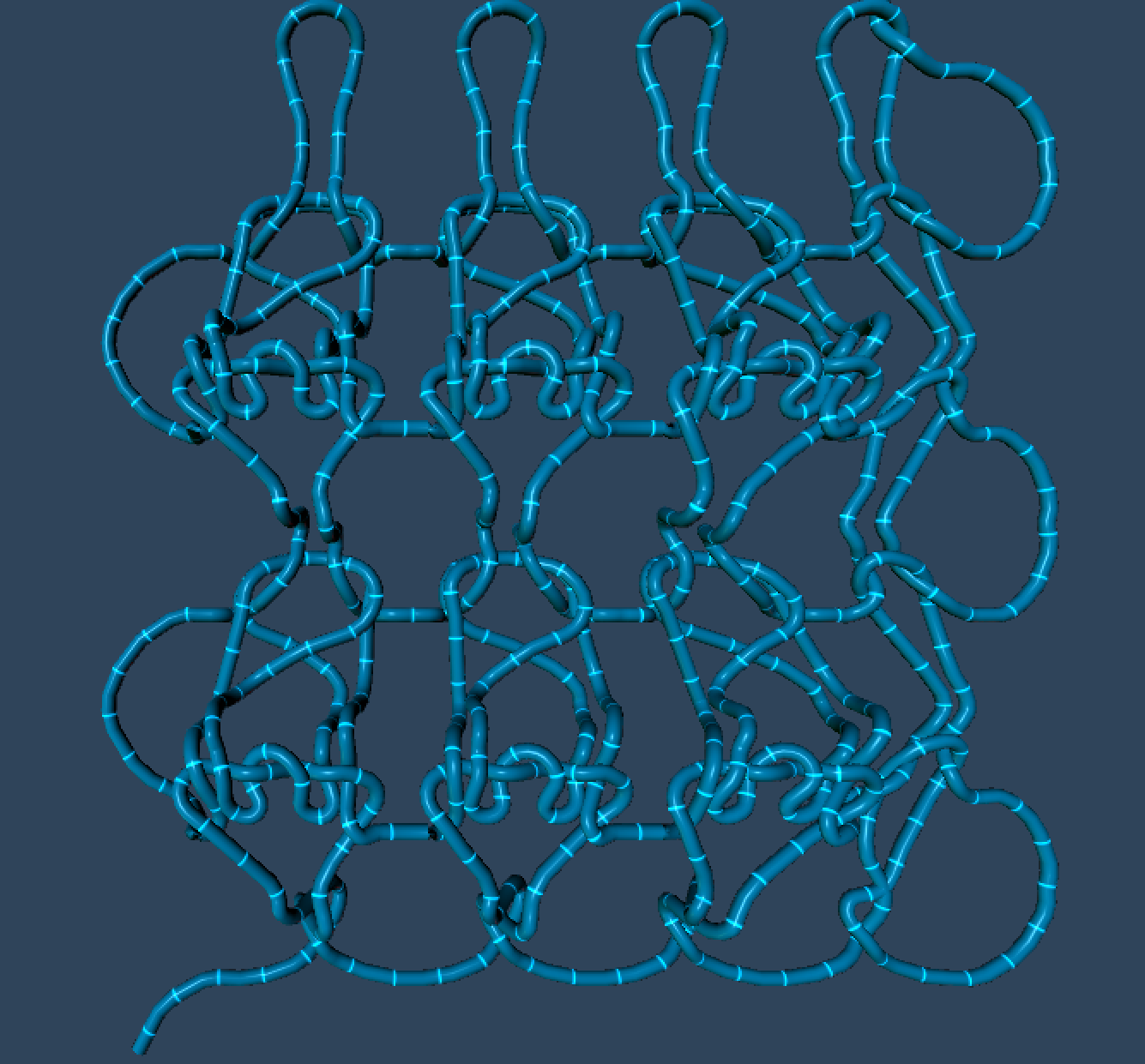
A project for making custom tools for an indie studio for building game levels with hex grids, with height maps, allowing them to paint terrain, have blended terrain texturing, paint terrain properties and objects. The most interesting part of this project was to create blended hex-grid terrain with a fixed set of textures and a reasonable amount of draw calls. We implemented various shaders and "schemes" in pursuit of this goal.
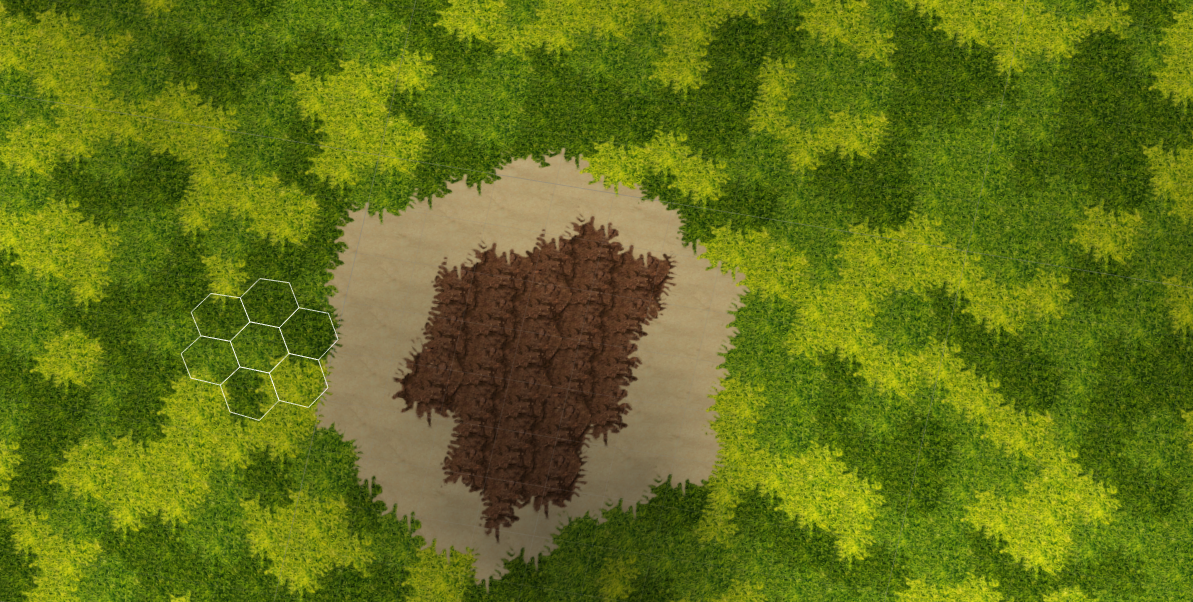
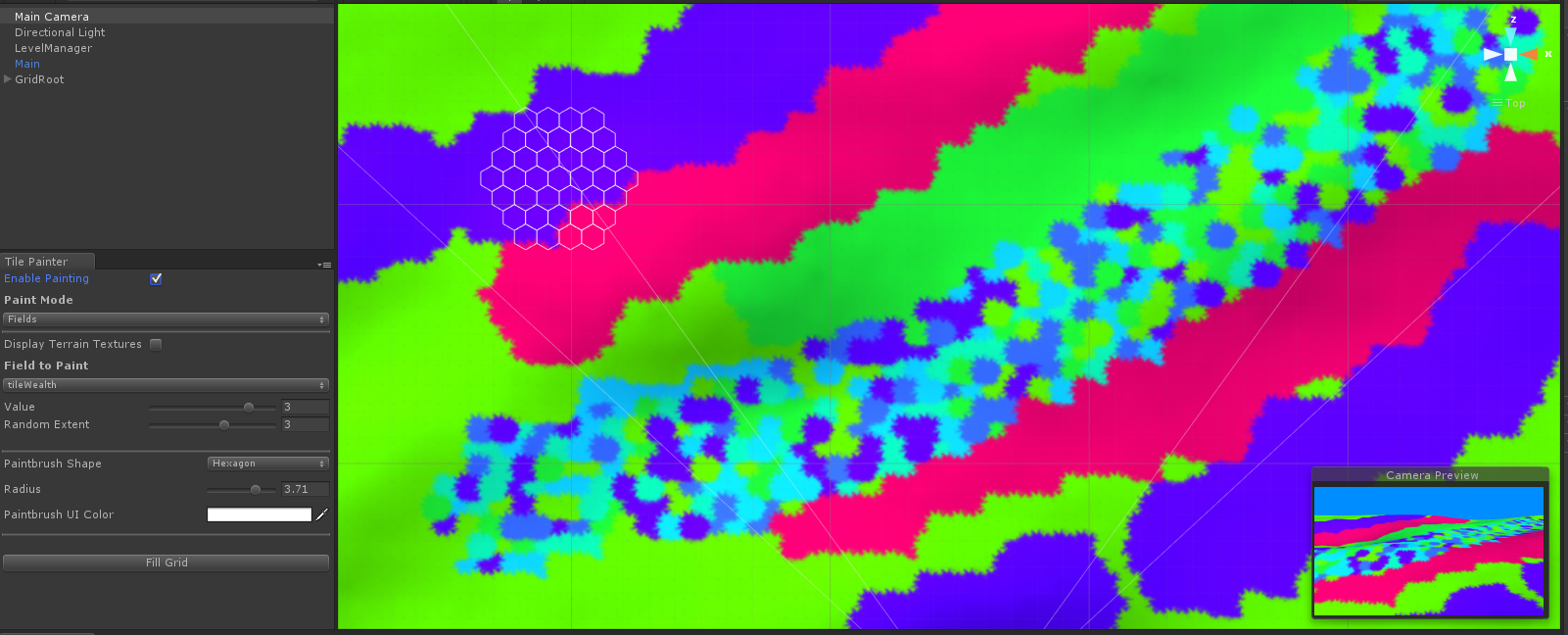
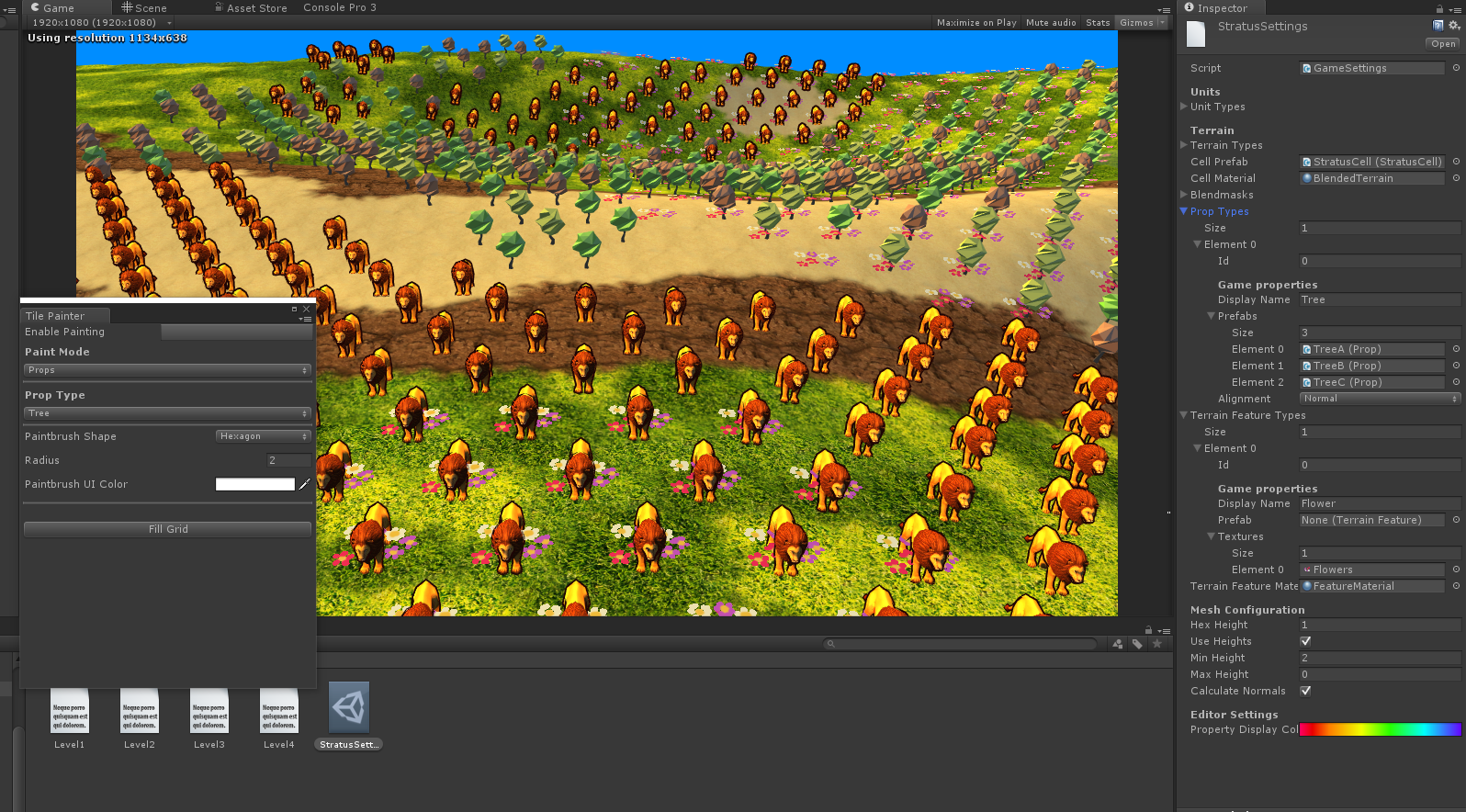
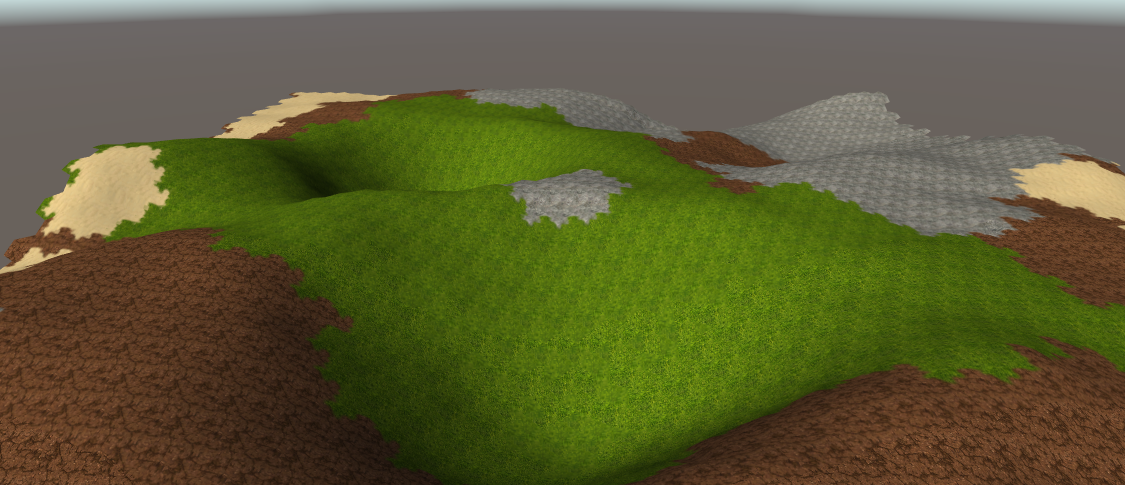
Then there is of course the tools we build for the asset store. I am honest: right now it is not the bulk of our income. However, it is the heart of our company, and it shapes what we do. At least some of your time will be spent on this. You will see we don't build tools that solve popular business problems (Facebook integration, game templates), nor along the line of "traditional game technology problems" (shaders, physics). We try to find problems with a mathematical and data-structure/algorithmic slant and try to solve them on a tool level. I don't know how other tool companies do this; but we do it this way: we research a lot of games (for each of our tools we played at least 100, you can see some of our findings on Gamasutra here and here.) We try to distill what developers really need (informed by our experience); we build lots of games (we built at least 70 games - however clonish and small - for Grids. We are planning our 30 Games in 30 Days project for Abstract Strategy, which we just finish porting to Grids 2.0, the most progressive library for hex grids [and all other grids] on the planet :P). We develop some math. We not only listen to customers, but study their problems (what is really the best way to do path finding on a grid with asymmetrical costs and different sized units?) The next year we will be pushing a lot of node based editing tools, and some procedural generation tools (that is underlined by our generators that are available here.)
Let me know if you have any questions.
We at Gamelogic are looking to fill two fulltime senior programming positions. We require experience in C#, Unity, and comfortability with mathematics.
We are a small company (3 fulltime and 1 part time), but we have been around for two years (and individually have many years of experience). We are semi-temporarily "stationed" in Chile; so remote work is possible. (It would be great if you could come here for a few weeks occasionally, but not a requirement).
From our web site you will see our public front is mostly as a tool company; however, we also do games, and that would be the bulk of your work. (It is somewhat ironic that we make games to fund our grand dreams of making cool tools). Usually we get hired to do something very specific in a larger project (almost all our work comes from our Grids tool); so we are not the name on the label, but usually we get the parts that are most interesting technically.
For salary it depends on experience, but for around 5 years of solid experience we are looking at around R30 000.
(But that is just a number; we want people that can move our company forward, if what we do interest you, please talk to us!)
If you are interested (see below for what we do) please send me your CV: herman@gamelogic.co.za.
If you want to know what we are like to work with, @Rigormortis, @Chippit, @Tuism, @SUGBOERIE, @DraughtVader, @iceblademush and @dammit worked with us before.
To give you an idea of the type of work we do, here is some details from recent and ongoing projects (I cannot post screenshots of everything, but I can privately video-share if you want to see how these things look):
Multiplayer strategy, FPS combo game played in the real world on a grid. We did all the client-side strategy part. Some of the more interesting parts involved generating geometry from geo-data, and dealing with all the optimisations required for making a game in real-time in a very big area (the globe, of which about 400x400m is visible onscreen).
Multiplayer game with rules inspired by Game of Life (also played "in the real world") on a massive grid. This project is fun because we have time and budget to prototype and come up with good mechanics.
A project for simulating knitted fabric at yearn level. (This was not for a game, it was essentially a real-time implementation of this paper: https://www.cs.cornell.edu/projects/stitchmeshes/stitchmeshes.pdf). Although the money ran out before we could accomplish the final goal, it was extremely interesting. The bulk of the project revolved around geometric datastructures (a grid with constant time cell splitting, cell shifting and cell merging operations, and iteration in "curve-connected order") and geometric transformation (transforming a tile of curve segments to the shape of a cell in the split-grid), and some serious optimisation issues. (The paper accomplished their results in ~1 day of calculations; we had to reduce that to a few minutes). (We also got to understand the math behind knitting, how the curves work and are realised with actual string and needles.)

A project for making custom tools for an indie studio for building game levels with hex grids, with height maps, allowing them to paint terrain, have blended terrain texturing, paint terrain properties and objects. The most interesting part of this project was to create blended hex-grid terrain with a fixed set of textures and a reasonable amount of draw calls. We implemented various shaders and "schemes" in pursuit of this goal.




Then there is of course the tools we build for the asset store. I am honest: right now it is not the bulk of our income. However, it is the heart of our company, and it shapes what we do. At least some of your time will be spent on this. You will see we don't build tools that solve popular business problems (Facebook integration, game templates), nor along the line of "traditional game technology problems" (shaders, physics). We try to find problems with a mathematical and data-structure/algorithmic slant and try to solve them on a tool level. I don't know how other tool companies do this; but we do it this way: we research a lot of games (for each of our tools we played at least 100, you can see some of our findings on Gamasutra here and here.) We try to distill what developers really need (informed by our experience); we build lots of games (we built at least 70 games - however clonish and small - for Grids. We are planning our 30 Games in 30 Days project for Abstract Strategy, which we just finish porting to Grids 2.0, the most progressive library for hex grids [and all other grids] on the planet :P). We develop some math. We not only listen to customers, but study their problems (what is really the best way to do path finding on a grid with asymmetrical costs and different sized units?) The next year we will be pushing a lot of node based editing tools, and some procedural generation tools (that is underlined by our generators that are available here.)
Let me know if you have any questions.


^8113A0F44A36C6D04F9FBADC85B2CEED650FB56FFD3DF72860^pimgpsh_fullsize_distr.jpg
1335 x 1241 - 377K


blend5.PNG
1193 x 602 - 2M


Painter.PNG
1601 x 648 - 1M


UnitsAndTerrainFeatures.PNG
1596 x 884 - 2M


BlendMask.PNG
1125 x 485 - 972K

Comments
If I understand correctly, the games are mostly for clients, right? Do you usually find the clients are open to your advice, or do they usually come with fairly defined scopes? Are their any game projects that Gamelogic is working on or thinking of working on in the future, in additional to the tools?
As individuals, we all have a few games that we want to build at some stage, but those have not been adopted by Gamelogic yet. One reason is we have been too crazy busy to think about it. The other reason is that we have two pretty big continuous investments that will only pay off only in several years that drain a lot of our cash (the one is the asset store tools and plans we have on that front; the other is the community building we have done here in Chile and the plans we have on _that_ front).
We filled one position, but are still looking for another programmer, and probably one or two more in the next 6 months.
The mysterious Strategy / FPS game I talked about in the OP "went live" in beta form for its Indiegogo campaign (which seems to go very well so far):
https://www.indiegogo.com/projects/father-io-first-real-life-massive-multiplayer-fps--2#/
I add it as an extra example of what we do and to prove we are not a pie-in-the-sky studio :)
So, if you are a C# Unity programmer that like that we do, please apply!